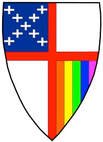|
There’s a lot of themes about water lately. That beautiful Spiritual: Wade in the Water…
Today We have Moses bringing water from a rock, the site of the well of Jacob, and Jesus’ pronouncement of living water. Last week Father Masud Syedullah spoke about water as creation, and remembering that we are born out of water -we arrive in an amniotic fluid, which breaks as we enter into the world. It’s like Genesis, where God divided the waters from above and below, and made the heavens and the Earth and all that’s in it. New Creation. Children. Today, the children will be doing a workshop with Maribel which will include water and the structure of snowflakes. Snowflakes are made of hexagons the most common shape intrinsic in nature. And yet we also know that no snowflake is ever alike. They are each unique as we are. Through the new and old testament water is used as a symbol of wisdom. It flows; it navigates gracefully; it is a creative force that adapts and changes, can transform, and like a stream will move toward the source, to the powerful ocean. Wisdom: It’s something that we thirst for; it’s something that we desire; it is something that we seek. And indeed something we require for life. So water is nuanced both spiritually as well as literally in our stories. The people in their exodus from Egypt, in their thirst wonder is “The Lord with us, or not?”! It is our question when we are struggling… it is the question of the Samaritan woman… and it is the mission of Jesus to say: yes, God is with you. In the Gospel story today there is a lot about thirst, and seeking and wisdom. It’s about bonding - having this deep conversation: a deep theological conversation between two people from different cultures. It’s one of the longest recorded conversations Jesus has with another in the Bible…and it’s deep as the well is deep. Jesus has come through Samaria, not because it is necessary physically to get from point A to point B (we know from maps), but spiritually it is necessary for him to enter Samaria: To bring the message as he says to his disciples …to that “field that is ripe.” Ripe for harvesting. The people are ready… and perhaps we are ready to reach across the divide. Jesus comes and engages a woman in conversation who is completely surprised by his presence and this bold address from a Jewish man. She is in the midst of her daily routine drawing water. And the water of the well as symbolic of wisdom, gives us two levels of meaning here…she has also come to this space that represents part of her spiritual identity. It’s not any old well of water. She’s come to the well of Jacob, where her ancestors have been worshiping for a long time upon this mountain. Now Samaria is made up of people that have been brought together in this region through resettlement after the Babylonian war. The King of Assyria captured the Israelites of Samaria and deported them to Assyria, and, not only that - but brought in peoples from five different Babylonian cities to resettle Samaria, worshipping their five different Gods… The original Samaritans who were not replaced worship Yahweh, but believe Mt. Gerizim, the place of Jacob’s well is the holiest place, not Jerusalem. But by Jesus time, Samaria is also made up of individuals who have brought five other gods that they have been praying to and sacrificing to. The region is not of the one God, Yahweh, who had originally made a covenant with the people before the Babylonian war. So this is very interesting to me, and this is why I think the Gospel of John is so brilliant because he’s talking to us on two levels…about revelation and conversion of a whole region explaining one larger version of history through metaphor… and through a very personal connection between a woman, seeking wisdom and depth who encounters the Messiah in that process. She says to him but you say that we have to go to Jerusalem for one God, and he says to her, I’m not saying you have to go to Jerusalem. I am saying that God is found in spirit and in truth not in any one location. “God is Spirit, and His worshipers must worship Him in spirit and in truth.” That God is available to you wherever you are. That is radical good news. John’s message is wrapped up on the personal level through a story that conceives her as having had five husbands. This is John’s brilliant way of talking about that covenant relationship of God to his peoples. In both the Old Testament and the New we hear of the metaphor of Israel often as a woman and God as her bride groom. A bond. And this is what’s happening for Samaria. Jesus has entered Samaria and positions himself at the well with an encounter with a woman. Well-encounters are found in famous stories from our patriarchs and matriarchs. They remind us of, Jacob and Rachel, Isaac and Rebekah, of Moses and Zipporah. These encounters between men and women at wells, are about marriage. So we have the symbol of the bride and groom. John is telling us about a particular encounter with the grander message that God, the bridegroom of Israel, is and has always been the bridegroom of Samaria: One God for all people. A covenant relationship God means for the whole world. Jesus’ successfully conveys to her that God is a God of Spirit who is not found in one location and is meant to be living water, and that is a saving message for the whole world. The Samaritan woman runs to share her experience with the town. And upon meeting Jesus, there is a conversion of the entire Samaritan village who come to believe Jesus is the Messiah. We have a radical bonding of peoples that have been estranged from one another. For us today, we may not think of the Messiah as having been brave, but the human Jesus and his disciples were quite brave in entering the Samaritan territory. The Samaritan woman was also brave in her conversation with Jesus. They each were willing to brave the gap. She is willing to express her own beliefs and he is willing to listen. He takes the conversation from the literal to the spiritual, and she keeps up. They are both listening closely to one another. Their conversation is a model for all of us. There is mutual give and take. They model that in our very intimate encounter with the Messiah, we will find that like the Samaritan Woman “we are fully known.” God incarnate in Jesus shows us the willingness to reach beyond our human made boundaries; that God in Spirit and Truth will repair and reconcile us to ourselves. There will be no lost remnant…. That relationship is always available, God as Love incarnate is the well from which we may draw ceaselessly because the well is not simply deep, it is living water that flows …in Spirit and in Truth. “the savior for the whole world" brings the radical and healing message that we are all the Spiritual children of a Living Loving God. For each and every one of us is unique as snowflakes and marvelously made! And our mission is to reach across divides to love others, to be brave in our conversations, to be loving in our listening, to be wise… to be Wise: adaptive like water, to be graceful in our encounters, to remember that we always flow from and toward the source, we name God.
0 Comments
Leave a Reply. |
AuthorThe Rev. Heather K. Sisk Archives
July 2024
Categories |
We Would Love to Have You Visit Soon!
WE ARE ALL MADE IN THE IMAGE OF GOD |
Telephone845-635-2854
|
|
 RSS Feed
RSS Feed

